One question catches my attention quite often—from the little girl in the cart behind us in the grocery checkout line to the boy observing our family from the end of the aisle where his mother selects baby food.
“Why does that baby look like that?”
Our daughter Brenna was born in December 2011 with a severe genetic skin disorder called Harlequin ichthyosis. Brenna’s skin condition gives her the appearance of a red, peeling sunburn covering her entire body. What it means is that her skin doesn’t do the jobs for her body that most people’s skin does … jobs like keeping her hydrated, protecting her from bacteria, and regulating her body temperature. She doesn’t even have the ability to sweat.
What it also means is that she gets a lot of stares from kids, teens, and even adults who wonder why she looks the way she does.
Visual differences can be found everywhere, and teaching our children about differences is essential to helping them become accepting, kind, and respectful individuals who live out God’s command to love others. Understanding difference begins at home; parents can choose many ways to foster a better understanding of physical differences so children can learn and fully appreciate that everyone was uniquely made by a wonderful Creator.

BE UP FRONT ABOUT DIFFERENCES
Kids learn by asking and seeing and experiencing. Children will inevitably ask questions about something they see that is different than what they are used to, and it’s important that difference not be a taboo subject. Be open to discussions with your children and teach them how to ask questions about other people in a respectful manner with kind words.
While it may feel uncomfortable, frantically removing yourself from situations where a child asks a question about how someone looks or speaks could give your children the impression that people who look different are frightening and should be avoided, instead of simply people.
If you’re worried about them blurting out something offensive that may hurt someone’s feelings, teach them how to whisper a discreet and polite question in your ear. If it’s an extremely sensitive subject, then you can tell them you’ll discuss it later.
READ TO THEM ABOUT DIFFERENCES
Many wonderful children’s books celebrate looking different or being yourself, and reading with your child can open up opportunities to discuss different feelings and interests, and uniqueness in general.
Some of our family’s favorite children’s books about being different include:
The Colors of Us by Karen Katz
Whoever You Are by Mem Fox
Not Your Typical Dragon by Dan Bar-el
Different Is Awesome by Ryan Haack
Extraordinary Friends by Fred Rogers
LIVE IT
Take your children to parks, activities, and events where people aren’t necessarily mirrors of them. If they are frequently around other people of various ages, colors, and abilities, they will be much less intimidated by visual differences. In fact, seeing others who look different on a regular basis means they probably won’t even notice the differences!
MODEL IT
If your children see you socializing with people only like yourself and hear you making comments about someone else’s physical appearance, they will imitate that. However, the reverse is also usually true: if you are genuinely friendly and respectful to everyone you come across, your children will naturally tend to model that behavior.
HELP THEM RELATE TO IT
It can be easy for children to forget that behind the “different” is someone just like them—someone who has loving parents and siblings, someone who may enjoy the same movies, or like the same kinds of food, or laugh at the same jokes.
Try to help your child relate to those who look different in any way you can—“She was born with that birthmark just like you were born with blue eyes!”—so that they better understand that physical differences are a part of everyone’s lives. And don’t stop there—maybe they both like pizza or Disney movies! Being able to relate to someone helps a child feel more comfortable with that person, regardless of what they look like.
Seeing the humanity in difference is one of the most important things you can do for your child and will give them the empathy they need to grow into respectful and understanding adults who treat others the way they want to be treated as our great God commanded.
